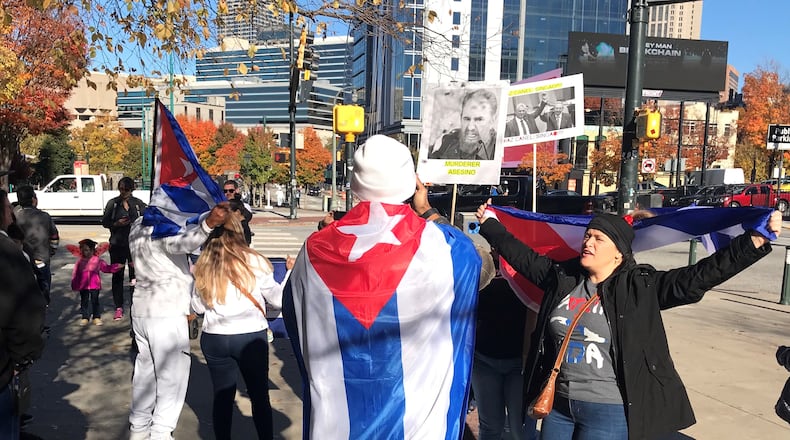Stationed on opposite street corners steps away from Centennial Olympic Park, two immigrant groups held simultaneous protests on Sunday to advocate for change in their respective homelands.
As they have done with regularity since anti-government demonstrations made history in Cuba over the summer, Atlanta-based Cuban Americans gathered to call for an end to Cuba’s authoritarian regime. Organizers say they scheduled the rally on Sunday – which drew nearly 50 people – to show support for the Cuba-based activists planning a day of protest on the island today.
Across the street at the intersection of Marietta St. and Centennial Olympic Park Dr., a dozen members of the Indian exile community met to protest Facebook. A recent release of leaked documents show the social media company’s India operation dithered in clamping down on misinformation, hate speech and Islamophobic content.
“We were shocked when we [found out about] the internal documents from Facebook showing what is going on there,” said Zameer Khan, president of the Atlanta chapter of the Indian American Muslim Council (IAMC), an advocacy group.
‘Down with communism’
Over the course of the afternoon, Cuban American rally goers, many of them draped in their homeland’s tricolored flags, broke out in chants of “down with communism,” “freedom for political prisoners,” and “patria y vida,” or “homeland and life,” the popular counterrevolutionary rallying cry.
Among the crowd was Indira Rodriguez, who moved to the U.S. 16 years ago as a political refugee.
“As long as there are people within Cuba fighting for freedom, the least that those of us outside the country can do is to support them,” she told the AJC in Spanish. “It’s our responsibility, it’s our obligation as Cubans.”
In July, thousands of Cubans across the island took to the streets and marched in the largest protests the country has seen in decades, where they called for freedom and wider access to food and medicine. On Monday, dissidents hope to build on the protest movement’s momentum with a planned “Civic March for Change,” a nearly unprecedented development that was on the minds of the Cuban Americans gathered in Atlanta.
“We are supporting them from afar,” said Amhed Cabrera, who left Cuba six years ago. “In this country, you have ability to go out on the streets and have a peaceful demonstration. In Cuba it’s the opposite. The dictatorship opposes all that.”
In the wake of the July protests, some 1,000 people were arrested on the island and 659 remain jailed. Cuban security forces also detained protest leaders on Sunday ahead of Monday’s march, according to media reports.
“There are no basic human rights there,” said Frank Fernandez, a second-generation Cuban American. “We came to show our solidarity.”
Like many in attendance at the downtown Atlanta rally, Fernandez came with two of his children, ages 11 and 12. The pair were holding signs that said “viva Cuba libre.”
“I think it’s important that they know the history of their family,” he said. “I want them to know that over there in Cuba there are kids their age who don’t have the freedoms and the opportunities that they have here, thanks to the sacrifice of their grandparents.”
Rodriguez says she is proud that Atlanta is among the 120 cities around the world that have held rallies in support of Monday’s march.
“It’s important because Georgia is a big state, and us Cubans aren’t very visible. But we are here, and we have to make our voices heard,” she said.
Credit: Lautaro Grinspan
Credit: Lautaro Grinspan
‘People are afraid’
Across the street, protesters waved signs with messages including “Facebook, Hatebook?” and “Stop anti-Muslim violence.” The protest was one of seven organized across the U.S. by the Indian American Muslim Council in response to revelations inside internal Facebook documents leaked by whistleblower and former Facebook engineer Frances Haugen.
The documents show that Facebook struggled to curb the spread of misinformation, hate speech, anti-Muslim posts and celebrations of violence in India, the company’s largest market. Anti-Muslim material online has recently triggered a wave of violence targeting Muslims.
“There are real people who are on the receiving end of this. That’s our concern. If we don’t put a check in place, you may see the acceleration of anti-Muslim hate, Islamophobia in India,” said Khan, who has relatives still living in India.
”There is a sense of fear in the people. People are afraid.”
Credit: Lautaro Grinspan
Credit: Lautaro Grinspan
Lautaro Grinspan is a Report for America corps member covering metro Atlanta’s immigrant communities.
About the Author
Keep Reading
The Latest
Featured





